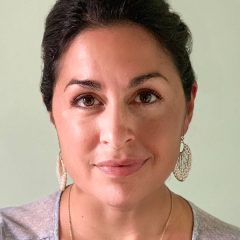MSW Specialization: Social Work within Justice Systems
The learning approach in the Social Work within Justice Systems (SWJS) specialization will be trauma-informed, culturally grounded, and strengths-based, and will emphasize the development of advanced knowledge and skills in practice with individuals, families, and groups. Students will explore some of the most salient dynamics of clinical practice and learn theories of crime and delinquency, how to analyze justice system policies, and reform efforts, particularly how to be involved in transforming a system of control and oppression into one of healing and restorative justice.
From Jane Addams Faculty

I think this specialization is truly unique. It provides the opportunity for students to build their skills and knowledge regarding how systemic racism and structural violence result in disproportionate adverse outcomes for people of color, working through a trauma-informed and strengths-based lens.
| Associate Professor and SWJS Specialization Chair

This specialization will give students a deep dive and cutting-edge perspectives on working within justice systems, as well as finding ways to reform and abolish various systems. We’re providing students with the best evidence-informed knowledge to serve impacted individuals, and also ways to transform the system, whether through restorative practices or working in partnership with organizations and systems.
| Assistant Professor

Students within the SWJS specialization will have a unique opportunity to understand how best to serve those impacted by carceral and correctional systems, but also develop ways to think about programs, policies and services that will assist in transforming systems from within and in the community, to promote healing and justice.
| Assistant Professor

The expanding field of criminal legal reform and violence prevention indicates there is a tremendous need for talent and leadership. This specialization gives JACSW students a professional advantage upon graduation.| Assistant Professor
The Perspective of a Person with Lived Experience

When I was in prison, we may have had four social workers serving a prison population of about 1,000 people. We need to have more social workers in the system, not fewer, and they need to be properly trained to work with this population.
If we want returning citizens to be better off than when they went in, then we should give a lot of attention to the responsibilities of being a social worker, and get behind them, and give them all the tools and training they will need. A good social worker can help you come out of prison prepared to win.
Social workers have the ability and responsibility to begin the healing process for incarcerated individuals. So many people in the system have been forgotten, neglected, or abandoned, and social workers have the ability to mend those bridges and help families heal. As far as I know, the warden can’t do that and the correctional officers can’t do that. Restoration starts with the social worker.
| Community Navigator for Acclivus, Inc.
Be an Agent of Social Change
If you’re ready to be an agent of social change, supporting individuals, families, and communities, and advocating for more just and equitable public policies, then apply to the Jane Addams MSW program today!